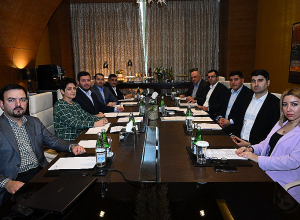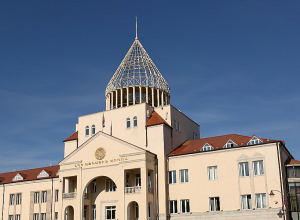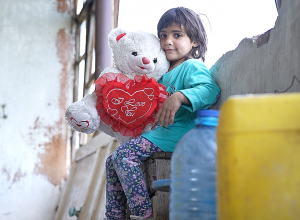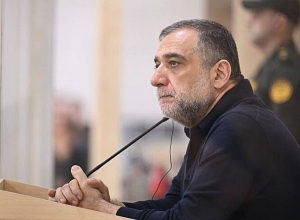PACE President: “Sometimes I had very difficult discussions in Armenia” (video)
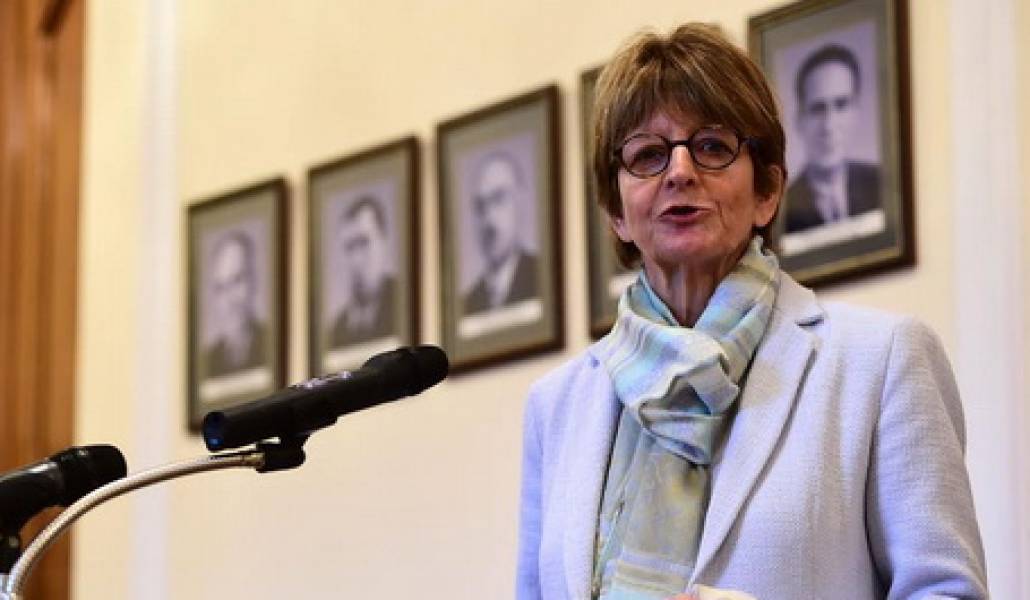
Anne Brasseur, President of the Parliamentary Assembly of the Council of Europe (PACE), paid an official visit to Armenia from 13 to 15 April, 2015. In Yerevan, Ms Brasseur met the President of the Republic, the Prime Minister, the Speaker of the National Assembly and the Foreign Minister, as well as parliamentary groups of the National Assembly, the Armenian delegation to PACE and representatives of civil society. Аt the end of the two-day visit to Armenia Anne Brasseur answered A1+’s questions. Has Armenia been honoring its obligations since the country joined the Council of Europe? “I really enjoyed the hospitality of Armenia and I must really say that the Armenian authorities did a lot in order to fulfill the commitments they took when they joined the Council of Europe. For instance, there are a number of conventions, which were signed and ratified and also implemented, which is really important. But, of course, there is room for manoeuvre and to improve. There are certain conventions which still have to be signed and ratified. There is, for instance, one convention and I am really pushing on that because it is important. That is the Convention on preventing and combating violence against women and domestic violence (the Istanbul Convention). I was told by the Minister of Foreign Affairs and also by the Prime Minister and by the President as well as the parliamentarians that they are going to sign and ratify it because they do not want to be the last country to do it. After his visit to Armenia, Commissioner Nils Muižnieks stressed that gender inequality is a problem in Armenia. As former President of the Association of Libel Women of Luxemburg, what solution can you suggest in this connection? “First of all, sign the Istanbul Convention and then ratify it and also make the laws necessary. But the convention and laws are not enough. You have to change mentality. That is why you need a big discussion, a large discussion in the country. You need to gather also with Women’s Association. But it’s not only a matter of women, it’s a matter of the whole society that there is a change in mentality that women have to be equal and one day they don’t need to be protected anymore, because they are equal. There has really a lot of progress to be made and I think I managed to get this message through to the Government and also to Parliament. Has Armenia’s membership to the Eurasian Economic Union affected the country’s relationship with the Council of Europe? “No, it is a choice from Armenia and that is a political choice, which they wanted to do, and I think we should stop thinking in categories. If you go one way, you would be against the other. It doesn’t mean if you are going eastwards, then you are against the west. Some countries choose another way - they go west, but it doesn’t mean that they are against east. So what we need are political choices, which are based on facts and on realities. We need all the countries, we are one organization. The Council of Europe has 47 member states and we have to look at what unites us, not what divides us. The Assembly has announced several times that it is ready to support the Karabakh talks within the framework of the OSCE Minsk Group. However, at the same time a fact-finding group is set up in the Parliamentary Assembly to prepare a report titled “Escalation of violence in Nagorno Karabakh and other occupied territories of Azerbaijan”. A report with such a title and contents is unacceptable in Armenia as you know. How will you comment on it? A big part of my discussions with all my interlocutors were focused on this problem. We are not having a fact-finding mission. There was a vote and the majority decided to have that report with that title and the majority supported the rapporteur. It is true that there is an escalation of violence, and we must do everything to help to stop violence because I am thinking of the people living in Nagorno Karabakh and also at the border, who are suffering, people who are killed. And this is a region of the Council of Europe so it must be a concern of the Parliamentary Assembly as well, because it is about those people living there. I know that wasn’t welcomed but our aim is to help the situation of the people and now we need time to make a report and to make a balanced report and that was also the message I wanted to give to my interlocutors. Will the rapporteur come to Armenia? It is up to a rapporteur to decide. I am not going to tell the rapporteur and I can’t do it. A president cannot influence a rapporteur, but, of course, a rapporteur has to go to places. You know, I came here and last week I was in Turkey. In the beginning of May I am going to Georgia because I want it. Last year I was in Azerbaijan. I want to have a picture of the whole region. It is not to take one country isolated, because none of the countries is an island. It’s important to have a full picture and a true report but what is more important in parliamentary diplomacy is to meet these people, to speak to them, to have the personal relations in order to try to understand them. At the end of your visit to Turkey you said Turkey has always been a bridge between Europe and Asia and Turkey is more essential than ever. Two days ago when Pope Francis called the massacres of Armenians the first genocide of the 20th century, Turkey’s reaction was very sharp and rapid. How can a country that demonstrates a denial policy become a bridge between Europe and Asia? I must say that what the Pope said as a moral authority must be recognized. You need respect and you cannot tell such a moral authority, like the Pope, you cannot condemn him and call back the Ambassador which was done by Turkey. I don’t think that it is the right way to do it. Now every country can handle those difficult issues but I think it is also important to have respect for opinions of others and to listen to them and that is also about the Council of Europe. But Turkey is a bridge, because it is a bridge already geographically, if you take the geographical Europe and the bridge to Asia. Turkey has also a very huge responsibility and its responsibilities refer its neighbors. I went to Turkey also to speak about the problems Turkey has with its neighbor Armenia. You were referring to the massacre, which happened one hundred years ago and I really want to pay my respect and tribute to all the victims of this terrible massacre which happened. That is something which is not acceptable for anybody and we must recognize that. This morning I went to the memorial and laid down a wreath which was very important. Is there a political consensus in Armenia over constitutional reform? What do you think? “The Council of Europe has an important role to play through its the Venice Commission and the Venice Commission really accompanied [up till now] the preparation of texts. It's up to the country itself to decide which way to go, which sort of organization, which sort of constitution it is going to have. For us it's important that the decision is in line with the standards of the Council of Europe. There is another shortcoming in Armenia I want to address. That is the difficulty to have an independent judiciary and to fight corruption. That must be one of the priorities of this country and I addressed that, too. But concerning the Constitution, I told my interlocutors that if I could give advice then that needs to have a broad consensus. Of course, there are always people against, it but a broad consensus is needed, not only on the political side, but also in civil society that has to support this reform because it’s the fundamental law for the whole country, for the next future. You can't change the constitution all the time. So, the advice I could give to my interlocutors is really to take time and to discuss it in order to make the right choices for the country. Some days ago opposition leader Zhirayr Sefilyan and his friends were arrested and some opposition politicians call them political prisoners on the basis that they were arrested without legal proofs. Have you been informed about it during your meetings in Armenia? Yes. I talked about it and I don’t have elements enough to say what happened. Of course there is freedom of expression and that must be really our target. I can feel there is freedom of expression in this country. There is no problem, but freedom of expression goes also together with responsibility and apparently those who demonstrated, they wanted to go too far and apparently, and I say apparently, because I'm cautious, I am not investigating that, there could be a violation even of the Constitution and demonstration, freedom of association, freedom of movement, freedom of speech, freedom of expression. Those are the fundamental freedoms. The Convention on Human Rights is based on those freedoms, which have to be exercised in the legal framework and everybody has to respect them. If somebody goes beyond and violates a national law or even the Constitution, that is not acceptable. So I am not saying that it isn’t acceptable but I say that it has to be investigated. It is important that there is independent investigation and that the truth is known. The judiciary must be independent, must be accountable and also impartial and the public must have the feeling that there is no impunity. It is important also to develop a democratic state. And the last question. What conclusions did you make during the visit in Armenia? My visit isn’t finished yet. Sometimes I had very difficult discussions, but I think that is positive, because if you don’t dare to tackle questions, you cannot find solutions, so you have to put the right questions in order to find solutions and what is important for me is that we agree to speak to each other, to listen to each other, to try to understand each other, even if we don’t share the same opinion but then find a common solution. And I found really very good interlocutors and that has to continue. Meetings help us see what see what unites us and not what divides us. What unites us is the conventional human rights and we are all in our countries committed to it. It is the commitment our countries took, it is our responsibility to watch in our own country and also in other countries that those commitments are really implemented and there I can see that Armenia is doing a lot and we are ready to help them to do the next steps.
